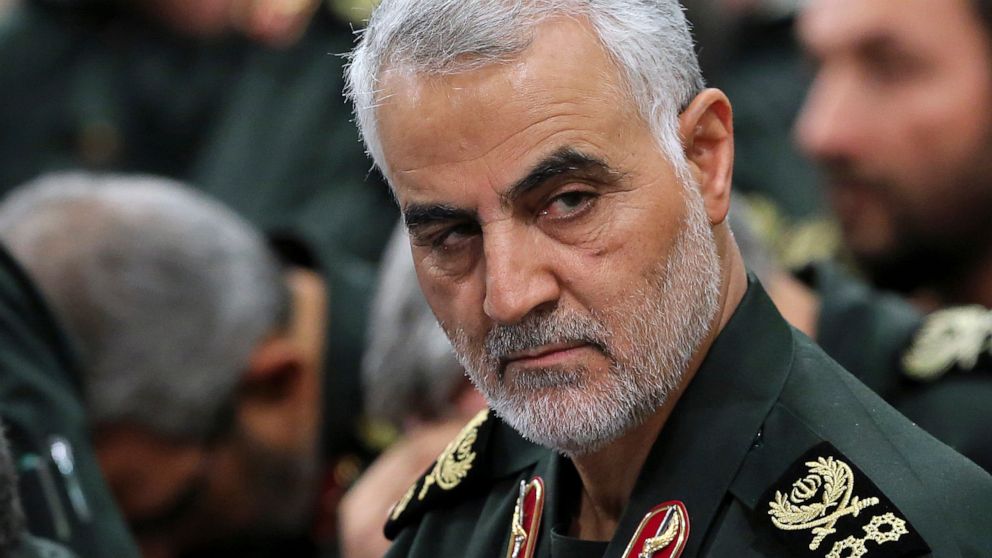[ad_1]
BAGHDAD —
Thousands of mourners gathered Saturday for a funeral procession through Baghdad for Iran‘s top general and Iraqi militant leaders killed in a U.S. airstrike that has caused regional tensions to soar.
Gen. Qassem Soleimani, the head of Iran‘s elite Quds force and mastermind of its regional security strategy, was killed in an airstrike early Friday near the Iraqi capital’s international airport.
Iran has vowed harsh retaliation, raising fears of an all-out war. U.S. President Donald Trump says he ordered the strike to prevent a conflict. His administration says Soleimani was plotting a series of attacks that endangered American troops and officials, without providing evidence.
Soleimani was the architect of Iran’s regional policy of mobilizing militias across Iraq, Syria and Lebanon, including in the war against the Islamic State group. He was also blamed for attacks on U.S. troops and American allies going back to the 2003 invasion of Iraq.
Many of the mourners were dressed in black, and they carried Iraqi flags and the flags of Iran-backed militias that are fiercely loyal to Soleimani. They were also mourning Abu Mahdi al-Muhandis, a senior Iraqi militia commander who was killed in the same strike.
The procession began at the Imam Kadhim shrine in Baghdad, one of the most revered sites in Shiite Islam. Mourners marched in the streets alongside militia vehicles in a solemn procession.
As tensions soared across the region, there were reports overnight of an airstrike on a convoy of Iran-backed militiamen north of Baghdad. Hours later, the Iraqi army denied any airstrike had taken place. The U.S.-led coalition also denied carrying out any airstrike.
The Popular Mobilization Forces, an umbrella group of mostly Iran-backed militias, and security officials had reported the airstrike in Taji, north of the capital. An Iraqi security official had said five people were killed and two vehicles were destroyed.
It was not immediately clear if another type of explosion had occurred.
Iraq, which is closely allied with both Washington and Tehran, condemned the airstrike that killed Soleimani and called it an attack on its national sovereignty. Parliament is to meet for an emergency session on Sunday, and the government has come under mounting pressure to expel the 5,200 American troops based in the country, who are there to help prevent a resurgence of the Islamic State group.
The U.S. has ordered all citizens to leave Iraq and closed its embassy in Baghdad, where Iran-backed militiamen and their supporters staged two days of violent protests earlier this week in which they breached the compound.
No one was hurt in the protests, which came in response to U.S. airstrikes that killed 25 Iran-backed militiamen in Iraq and Syria. The U.S. said the strikes were in response to a rocket attack that killed a U.S. contractor in northern Iraq, which Washington blamed on the militias.
The killing of Soleimani comes after months of rising tensions between the U.S. and Iran stemming from Trump’s decision to withdraw from the 2015 nuclear deal and restore crippling sanctions.
The administration’s “maximum pressure” campaign has led Iran to openly abandon commitments under the deal. The U.S. has also blamed Iran for a wave of increasingly provocative attacks in the region, including the sabotage of oil tankers in the Persian Gulf and an attack on Saudi Arabia’s oil infrastructure in September that temporarily halved its production.
Iran denied involvement in those attacks, but admitted to shooting down a U.S. surveillance drone in June that it said had strayed into its airspace.
Global powers had warned Friday that the killing of Soleimani could spark a dangerous new escalation, with many calling for restraint.
In Iran on Saturday, every major newspaper and state-controlled TV broadcast focused on Soleimani’s death, with even reformist newspapers like Aftab-e Yazd warning that “revenge is on the way.”
Billboards have appeared on major streets showing Soleimani’s face, many carrying the warning from Supreme Leader Ayatollah Ali Khamenei that “harsh revenge” awaits the US.
In the hard-line Kayhan newspaper, editor-in-chief Hossein Shariatmadari wrote Saturday that Iran shouldn’t hesitate to retaliate. He criticized an earlier statement by the country’s Supreme National Security Council saying an attack would come at the “right place and right time.”
“America and its allies are sitting in a glass room and are vulnerable on every side, so we can say for sure that all the preparations are ready for harsh revenge on terrorist America,” wrote Shariatmadari, who was appointed by Khamenei.
The “glass room” comment may refer to the United Arab Emirates, home to the skyscraper-studded city Dubai, which Kayhan previously has warned was a target for Iranian-backed forces. The UAE also hosts some 5,000 American troops at Abu Dhabi’s Al-Dhafra Air Base. Dubai’s Jebel Ali port is the U.S. Navy’s busiest port of call outside of the U.S.
In Saudi Arabia, a longtime foe of Iran, the English-language daily Arab News printed a front-page editorial showing Soleimani’s face, headlined: “He will kill no more.” Last year, the newspaper promoted the idea of “surgical” U.S. airstrikes on Iran after a drone attack on an oil pipeline in May.
A top Saudi diplomat on Saturday sought to further elaborate on the country’s official statement calling for “self-restraint” to avoid “unbearable consequences.”
“The Kingdom’s statement regarding the events in Iraq stresses the Kingdom’s view of the importance of de-escalation,” Adel al-Jubeir, the minister of state for foreign affairs, wrote on Twitter.
———
El Deeb reported from Beirut. Associated Press writers Joseph Krauss in Jerusalem, Jon Gambrell and Aya Batrawy in Dubai, United Arab Emirates, and Amir Vahdat in Tehran, Iran contributed.
[ad_2]
Source link

